INTRODUCTION L iving well is the best revenge. If the Mediterranean diet could be summed up in one sentence, that would be it. Living well is simply a way of life for Mediterraneans, where eating a diet that is based on vegetables, grains, and legumes, with small amounts of dairy, eggs, and poultry, and even smaller amounts of red meat is the norm. But so too is dining with friends and getting regular physical activity. If a sunny trip to Greece or Italy or the south of France appeals to you, this diet will take you there in spirit. If you visit the region, you will find there is no single Mediterranean diet that all inhabitants of countries as disparate as France, Italy, Spain, Turkey, Greece, and Israel follow, but there is a common thread.
Technically speaking, their diet is high in monounsaturated fatty acids, fiber, and antioxidants, and low in saturated fat. In 1993, the concept of a Mediterranean diet was introduced by Oldways, the Harvard School of Public Health, and the World Health Organization. The diet is based on research that began with Dr. Ancel Keys, who conducted a fifteen-year study of seven countries, which began in 1958. Numerous studies followed, and the results were impressive. Those in Mediterranean countries suffered from less heart disease and were generally healthier.
The studies seemed to prove that la cucina povera was actually healthier than more modern diets in more industrialized parts of the world. The Mediterranean diet is based on the traditional foods eaten by people living in the Mediterranean region, especially in Crete. If you remember the advice eat like your ancestors, youll be on the right track. Your ancestors did not eat soft drinks, processed food, or fast food, and neither should you. This diet is not specifically for weight loss but for overall health; however, it is possible to lose weight on the diet, especially if your usual eating habits align more with the traditional American diet of processed foods and bad fats. U.S. U.S.
News & World Report ranks the Mediterranean diet highly in the categories of Best Diets Overall, Best Diets for Healthy Eating, and Easiest Diet to Follow. Starting at the base, here are the basic guidelines for the Mediterranean Diet Pyramid: Every meal should be based on fruits, vegetable, grains (mostly whole), olive oil, beans, nuts, legumes, seeds, herbs, and spices. Fish and seafood should be consumed often, at least two times a week. Cheese and yogurt are allowed in moderation, daily to weekly. Poultry and eggs are allowed in moderate portions, every two days or weekly. Meats and sweets should be eaten rarely.
Drinking water is encouraged, and wine is allowed, especially red wine, in moderation. Physical activity is encouraged, as is enjoying meals with others. While eating habits and diets vary greatly in the Mediterranean, research shows that the people who live in this region tend to eat a diet high in fat, yet they have a much lower incidence of cardiovascular disease and cancer than people in other parts of the world. On the Mediterranean diet there are no calories to count, no specifically forbidden foods or bizarre food combinations. If you want to lose weight, you will have to limit calories and unhealthful saturated fat and, of course, exercise more. But the diet itself is as simple as can be.
Use the pyramid and guidelines, be inspired by the recipes, live well, and be healthy.  WHAT IS THE MEDITERRANEAN DIET? U nlike many diets, the Mediterranean diet isnt actually a diet at all, at least not in the traditional you-cant-eat-that sense. Its more of a guideline for living a long, healthy, happy life. You may have to make some modifications to your lifestyle and your way of thinking, but youre not going to need to give up a single thingexcept for bad health and unsightly body fat. In exchange, youll need to eat plenty of foods that taste delicious, find some vigorous activities that you enjoy, and spend more time with your friends and family. Sound good? If so, then this may just be the diet that youve been searching for! What Makes the Mediterranean Diet Different From Other Diets? Excellent question.
WHAT IS THE MEDITERRANEAN DIET? U nlike many diets, the Mediterranean diet isnt actually a diet at all, at least not in the traditional you-cant-eat-that sense. Its more of a guideline for living a long, healthy, happy life. You may have to make some modifications to your lifestyle and your way of thinking, but youre not going to need to give up a single thingexcept for bad health and unsightly body fat. In exchange, youll need to eat plenty of foods that taste delicious, find some vigorous activities that you enjoy, and spend more time with your friends and family. Sound good? If so, then this may just be the diet that youve been searching for! What Makes the Mediterranean Diet Different From Other Diets? Excellent question.
For the last several decades, the prevailing opinion among health experts has been that the key to maintaining a healthful weight and avoiding disease is eating a diet low in carbohydrates and fat. Unfortunately, this theory isnt backed by science. Your body needs healthful fats and good carbs to produce energy and fight disease, and your brain needs them to function optimally, too. The Foods The Mediterranean diet has a food pyramid that allows any kind of food but places them in a hierarchical order. Here, fattier meats and sweets are at the top of the pyramid, to be consumed in moderation. Foods high in nutrients, healthful carbs, and essential fats are at the bottom of the pyramid, as main components of every meal.
These healthful foods include fresh fruits and vegetables, whole grains, legumes, olive oil, herbs, and spices. The second-largest layer of the pyramid consists of fish and seafood, which you should eat at least twice weekly. The third layer is beneath meats and sweets and is composed of poultry, eggs, cheese, and yogurt, which should be eaten moderately on a daily or weekly basis. In addition to the following the food pyramid, you should consume a healthful supply of water and a moderate amount of wine. The Lifestyle Perhaps what really sets the Mediterranean diet apart is the fact that their pyramid is built atop a base that has nothing to do with nutrition. Instead, the basis for a healthy life includes being physically active and sharing meals based upon the food pyramid with other people whom you care about and enjoy spending time with.
Its a holistic approach that teaches that to be truly healthy and happy, you need to feed your mind and your spirit as well as your body. Eat Your Way to Better Health and Happiness The Mediterranean diet concept and illustrative pyramid were introduced in 1993, based on the eating habits of Greeks and Italians who lived along the Mediterranean Sea in the early 1960s. These people enjoyed extraordinarily good physical and mental health in comparison to Western eaters, and they lived longer, too. So what are the benefits of the Mediterranean diet? Here are just a few. Avoid Illness and Disease Fresh fruits and veggies have an enormous amount of vitamins, nutrients, phytonutrients, and antioxidants that help your body fight disease. Because the Mediterranean diet encourages you to eat a wide variety of produce as part of every meal and snack, your body will get the full spectrum of nutrients that it needs to function properly.
Antioxidants in produce fight off free radicals that cause all kinds of damage, including wrinkles and other signs of aging, dull hair, poor skin, heart disease, eye disease, and even cancer. Free radicals are the result of respiration, environmental pollutants, and some are even created by your body in order to carry out toxic cells, but too many are disastrous. Antioxidants neutralize free radicals before they can cause further damage. Consume Plenty of Fiber There are two basic types of fiber: soluble and insoluble. The insoluble fiber in fresh produce, legumes, and nuts acts like a broom and sweeps all of the accumulated food and toxins from your digestive tract so that it may function optimally. Soluble fiber binds with fatty acids and helps slow down sugar (glucose) absorption so that you have a steady supply of energy.
It also helps lower bad cholesterol, therefore promoting heart health, which moves us right along to the next benefit of the Mediterranean diet.

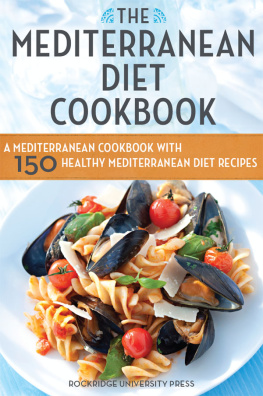






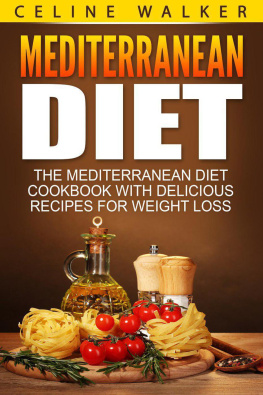
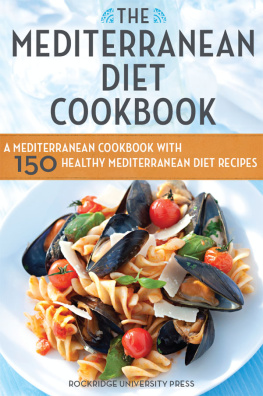
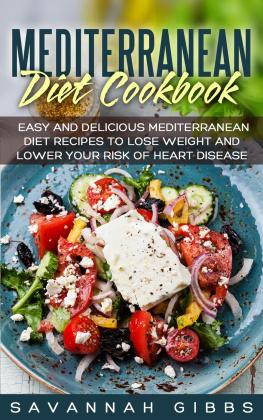
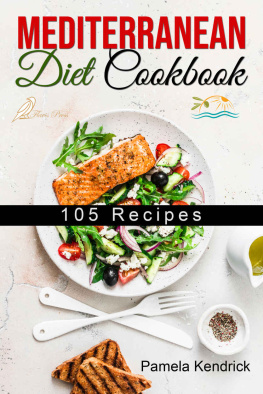


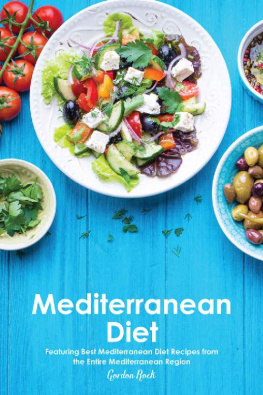
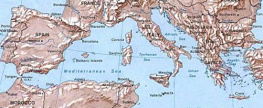
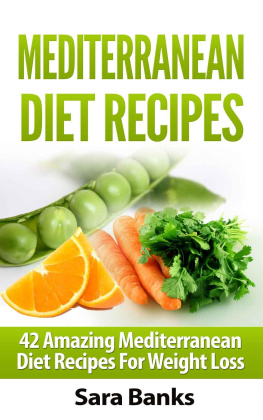

 WHAT IS THE MEDITERRANEAN DIET? U nlike many diets, the Mediterranean diet isnt actually a diet at all, at least not in the traditional you-cant-eat-that sense. Its more of a guideline for living a long, healthy, happy life. You may have to make some modifications to your lifestyle and your way of thinking, but youre not going to need to give up a single thingexcept for bad health and unsightly body fat. In exchange, youll need to eat plenty of foods that taste delicious, find some vigorous activities that you enjoy, and spend more time with your friends and family. Sound good? If so, then this may just be the diet that youve been searching for! What Makes the Mediterranean Diet Different From Other Diets? Excellent question.
WHAT IS THE MEDITERRANEAN DIET? U nlike many diets, the Mediterranean diet isnt actually a diet at all, at least not in the traditional you-cant-eat-that sense. Its more of a guideline for living a long, healthy, happy life. You may have to make some modifications to your lifestyle and your way of thinking, but youre not going to need to give up a single thingexcept for bad health and unsightly body fat. In exchange, youll need to eat plenty of foods that taste delicious, find some vigorous activities that you enjoy, and spend more time with your friends and family. Sound good? If so, then this may just be the diet that youve been searching for! What Makes the Mediterranean Diet Different From Other Diets? Excellent question.